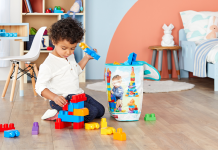Is your child a budding entrepreneur? Lisa Illingworth of FutureProof SA shares signs that may indicate that you are raising a mogul-in-the-making.
The most obvious trait of an entrepreneur that is exhibited in early years, is the ability to question everything. “Coupled with a curious mind and an insatiable need to figure out why things work the way they do, these kids will not conform to a set of social norms because it is expected,” says Lisa. “They will spend energy in unpicking a system and rebelling against it particularly if it seems irrelevant,”
Box, what box?
Many experts and some parents, use the phrase “they don’t fit into the box” to explain their child’s thinking and behaviour. “This is a phrase and terminology that adults have come up with to better categorize the entrepreneurial child,” says Lisa who is quick to point out that from the perception of the child, there is no box that they fit into, or don’t, and removing those expectations and even the framework will give them the freedom to explore their place in the world void of the judgement of adults.
Learning through doing
The word ‘entrepreneur’ comes from the verb ‘to orchestrate’ and this encapsulates that much of how entrepreneurs learn and grow, is through action. They take action and receive feedback and adjust their approach when taking the next action. “Kinesthetic or action-based learning is not a common method of teaching and learning in a traditional classroom” she explains. Modes of teaching are typically audio/visual based and linguistic. “An entrepreneur learns by doing, so if your child likes to experiment, dissect, re-engineer or test a concept using an action-based approach they are flexing their entrepreneurial learning muscles”.
People’s Person
The terms extrovert and introvert do not apply to entrepreneurship. “Extroverts typically gain their energy from being with people and introverts need to be alone to recharge. Neither proclivity is an indicator of an entrepreneurial leaning. What is however more applicable, is that the child draws on the experiences of others to inform their own decisions. They are able to interact with a multitude of different people and command their attention as well as glean from their learnings and apply them in their own decisions. They are adept at forming and utilizing a network of diverse individuals”.
Opportunists
The entrepreneurial child is a relentless opportunist. Where there is a gap or problem to be solved and a means to earn some extra cash, that’s where you’ll find your child. “They may not have the developed moral compass that guides those decisions towards ethical opportunities and may need you to help inform those, but they will almost always be the first to get into trouble for seeing a gap and exploiting it for economic gain,” says Lisa.
Powerful aguments
The powers of coercion and convincing are strong with this type of child. They are able to string together powerful arguments that will leave you questioning your own rational thoughts. “From vying for an extra piece of cake at a birthday party to reasons why bedtime is at the wrong time, this child is able to rustle up an argument that would put lawyers to shame!”
Forgiveness over permission
Otherwise known as the gift of the hustle, entrepreneurial kids are more likely to take a risk, try something out and if it succeeds carry on and if it fails, use their strong and safe relationships with parents and teachers to ask for forgiveness. “These actions are not taken with malicious intent or with the intent to harm others, in fact, for the most part they include an upside for friends and peers but it’s more than likely without the consent of an adult and quickly followed with an apology”.
Leadership
Without any formal mentorship or training, these kids take on the leadership role within their classroom or on the playground. In a formal classroom setting, particularly a traditional one, the child may not step up but in social settings shows up as the dominant personality and one that others look to for direction. They are good at building social and relationship capital even with other children outside of their immediate age group.






